|
|
|
Sort Order |
|
|
|
Items / Page
|
|
|
|
|
|
|
| Srl | Item |
| 1 |
ID:
134308


|
|
|
|
|
| Summary/Abstract |
The student-led anti–media-monopoly movement in Taiwan has generated strong momentum since mid-2012. In early 2013, the National Communications Commission responded by drafting the “Prevention of Broadcasting and Television Monopoly and the Maintenance of Diversity Act”, which was approved by the Executive Yuan in April 2013 and is now waiting to be debated in the Legislative Yuan. In contemporary Taiwan, the social is often connected with the political. The existing democratic system, which is a legacy of the democratisation process in the twentieth century, no longer seems adequate to serve the citizens of the twenty-first century. This paper considers the anti-media-monopoly movement and the burgeoning civic movements in recent years as part of a “second wave” of democratisation for further political reform and democratic consolidation. When martial law was lifted in Taiwan in 1987, the “first wave” of media liberalisation ended with the commercialisation of industry. The “second wave” of media democratisation has picked up where the first wave left off and may finally establish, through increasingly more thoughtful media policies, a better and fairer media environment that is more suitable for democratic Taiwan.
|
|
|
|
|
|
|
|
|
|
|
|
|
|
|
|
| 2 |
ID:
139127
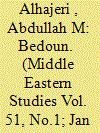

|
|
|
|
|
| Summary/Abstract |
The Bedoun (stateless/without nationality) in Kuwait constitute a controversial concurrent social, political and legal issue, which was and still is the subject of heated political debate, a vivid example of social conflict, and a platform of extensive legal deliberation concerning its thorny dimensions. The problem of Bedoun is not only politically and socially complex, but it has its problematic legal dimensions, which have made it, since the 1950s, a complex and chronic problem. The recent growing interest in addressing the issue and the extensive strife to determine its degree of complexity and entanglement could be ascribed to the margin of freedom enjoyed in Kuwait more than the rest of the Arabian Gulf states, since active social and political participation constitute the pillars of the democratic system in Kuwait, in light of the growing political and media freedoms and the focus on the Bedoun as a marginalized community legally, politically and socially. Therefore, the current problem ofBedoun constitutes the strongest internal concern for the Kuwaiti authorities and people after the external threats, especially because it has always been ignored or treated as a security issue at times. This study seeks to shed light on the issue of Bedoun to decipher its causes and its historical development until it became a pressing issue at government and community levels in the State of Kuwait. The study will avoid the complex legal and social complexities of the issue.
|
|
|
|
|
|
|
|
|
|
|
|
|
|
|
|
| 3 |
ID:
130944
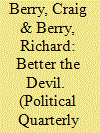

|
|
|
|
|
| Publication |
2014.
|
| Summary/Abstract |
Gus O'Donnell's vision of 'better government' is presented as a critique of party politics, most specifically the short-termism, selfishness and incompetence of elected politicians. There are few people better placed than O'Donnell to form such judgements. However, O'Donnell goes much further, by calling into question the legitimacy of the democratic system which gives rise to party politics. His article outlines several mechanisms by which the exercise of power by elected ministers could be constrained by a managerialist accountability framework, without addressing the question of who determines the appropriate framework for ministerial performance. The House of Commons is condemned as 'too politicised'. O'Donnell also offers substantial praise for apparently 'depoliticised' policy-making processes, overlooking the inherently political constitution of such processes. In doing so, O'Donnell claims to be challenging party politics on behalf of voters/taxpayers, but instead seeks to dismantle any possibility of the public expressing a collective will via the ballot box that might challenge the immutability of the market economy.
|
|
|
|
|
|
|
|
|
|
|
|
|
|
|
|
| 4 |
ID:
142857
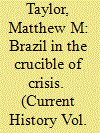

|
|
|
|
|
| Summary/Abstract |
Whichever way the impeachment train rolls, the … crisis has opened new fissures in a democratic system that has been in place only since 1985.
|
|
|
|
|
|
|
|
|
|
|
|
|
|
|
|
| 5 |
ID:
127582
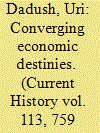

|
|
|
|
|
| Publication |
2014.
|
| Summary/Abstract |
The economic convergence of large parts of the developing world with the advanced nations is the great story of our time. Sixty years ago, Singapore was an impoverished, malaria-infested island whose future absolute ruler, Lee Kuan Yew, admired the prosperity and civilization of the United Kingdom, where he had been educated. Singapore's per capita income has since surpassed that of the UK and the rest of Europe by a wide margin and, more recently, that of the United States. Today, one in six households in Singapore has more than $1 million in disposable assets. And as its extraordinarily rapid economic development progressed, Singapore converged with the advanced nations in other ways: by rooting out endemic corruption, adopting strict environmental standards, and making progress toward a more pluralistic and democratic society.
|
|
|
|
|
|
|
|
|
|
|
|
|
|
|
|
| 6 |
ID:
101900
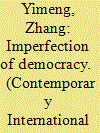

|
|
|
| 7 |
ID:
125953
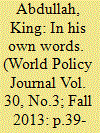

|
|
|
|
|
| Publication |
2013.
|
| Summary/Abstract |
Since the creation of the modern Hashemite Kingdom of Jordan, the monarchs King Hussein and his son, the current ruler King Abdullah II, have presided over a nation that has served as a model of tranquility and security, moving steadily toward an increasingly democratic system of government. As turmoil has shaken all its neighbors, the royal family has managed to guard its sovereignty and independence. King Abdullah II, described as the 43rd generation direct descendant of the Prophet Mohammad, ascended the throne of the Hashemite Kingdom on the death of his father in February 1999. Educated in the United States and Britain, after training at the British military academy at Sandhurst, he served as a major general in the Jordanian Army. During his 14-year reign, the kingdom's economy has flourished, and he has played a major role in encouraging an Israeli-Palestinian peace process. World Policy Journal editors asked His Majesty to illuminate, in his own words, the roots of Jordan's extraordinary record of security and democracy and the unique challenges posed by the complex neighborhood where his nation finds itself.
|
|
|
|
|
|
|
|
|
|
|
|
|
|
|
|
| 8 |
ID:
171333
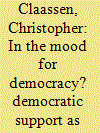

|
|
|
|
|
| Summary/Abstract |
Public support has long been thought crucial for the vitality and survival of democracy. Existing research has argued that democracy also creates its own demand: through early-years socialization and later-life learning, the presence of a democratic system coupled with the passage of time produces widespread public support for democracy. Using new panel measures of democratic mood varying over 135 countries and up to 30 years, this article finds little evidence for such a positive feedback effect of democracy on support. Instead, it demonstrates a negative thermostatic effect: increases in democracy depress democratic mood, while decreases cheer it. Moreover, it is increases in the liberal, counter-majoritarian aspects of democracy, not the majoritarian, electoral aspects that provoke this backlash from citizens. These novel results challenge existing research on support for democracy, but also reconcile this research with the literature on macro-opinion.
|
|
|
|
|
|
|
|
|
|
|
|
|
|
|
|
| 9 |
ID:
111305


|
|
|
| 10 |
ID:
103782
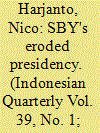

|
|
|
| 11 |
ID:
117131
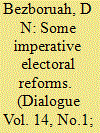

|
|
|
| 12 |
ID:
119426
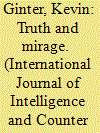

|
|
|
|
|
| Publication |
2013.
|
| Summary/Abstract |
In his 1967 novel, One Hundred Years of Solitude, Gabriel Garcia Màrquez wrote about the fictional town of Macondo as a place containing an "intricate stew of truths and mirages" where "God had decided to put to the test every capacity for surprise and was keeping the inhabitants … in a permanent alternation between excitement and disappointment, doubt and revelation, to such an extreme that no one knew for certain where the limits of reality lay." Garcia Màrquez later referred to Macondo as a "state of mind" more than any actual place, but the fictional town he created can be seen as somewhat representative of Latin America as a whole. Indeed, the recent history of Latin America comprises so many moments of "excitement and disappointment," so many highs and lows and so much "truth and mirage" that this region has fittingly given the world the distinctive literary style known as "magic realism.
|
|
|
|
|
|
|
|
|
|
|
|
|
|
|
|
|
|
|
|
|